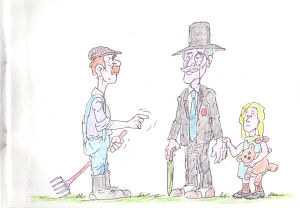The narratives dished out by Plum not only amuse but also educate the lay reader. Critics may label these as escapist fares, but that does not take away the kind of social and spiritual lessons which are embedded therein.
When a girl whom you have come to respect seeks your protection, you try to rise to her expectations. Suddenly, the spine which was made of cottage cheese gets transformed into one of chilled steel. You stand up to bullies and tell them where they get off. You look them in the eye and make them wilt, making them beat a hasty retreat from their time-tested positions. Like Angus McAllister, they suddenly find more merit in ‘ceasing to be a Napoleon than to become a Napoleon in exile.’
The Parva School Treat Transformation
When the story begins, we find that Lord Emsworth’s soul is weighed down with woe. The sun is going about its task with great aplomb, but he is unable to potter around in his own gardens. For, this is the day of the August Bank Holiday, ‘when a tidal wave of the peasantry and its squealing young engulfed those haunts of immemorial peace.’ In place of an old coat, he is forced to wear a stiff collar and a top hat and be genial. As if this were not enough, he is expected to make a speech in the evening.
However, by the time the story reaches its climax, he has become a transformed man. He has become a man amongst men. He can stand up to Angus McAllister, his gardener, and boldly reject his proposal to lay a gravel path through the moss-covered yew alley. He has even found the courage to give a piece of his mind to Constance, his dominating sister.
His foremost concern is to bring some sunshine into the life of Gladys, his girlfriend. If she has not had any nourishment, she must be provided a sumptuous fare not only for her but also for her younger brother, Ern. If she asks for flowers from the Blandings gardens, she must have them. He would rather walk back with her to the cottage she is staying at, rather than face the prospect of making a speech.
Doing the ancestors proud
Lord Emsworth detests the fact that he is no longer the captain of his soul. But he ends up acquiring the courage to stand up to the bullies in his life. From being a spineless and unspeakably unworthy descendant of ancestors who had certainly known how to handle employees, he can now boast of being a tough egg. Even though his soul quivers, the simple act of Gladys seeking his protection from a menacing Angus McAllister by slipping her small, hot hand into his, he secures a mute vote of confidence. It is something that he wishes to be worthy of.
Learning from kids of a metropolitan origin
Street smart kids of metropolitan origin have perfected their survival and self-preservation skills. They acquire a ‘breezy insouciance’ which their country cousins lack. Shyness is not one of the virtues they can boast of. They have no difficulty in translating their thoughts into speech. Their dog-management skills are something to write home about.
If they need to pick flowers, they stoop to conquer. They have no reservations about throwing stones at those who endeavour to thwart their floral ambitions. Those attempting to do so even run the risk of getting copped on the shin. And if someone were to deliver a sharp reprimand, they are not averse to biting them in the leg.
These are the kind of personality traits which appeal to someone like Lord Emsworth who believes that he is not a captain of his own soul. Kids with a kindred spirit end up earning his unalloyed reverence.
One of the kids who earns the awe and admiration of Lord Emsworth is Gladys. She is described as a ‘small girl, of uncertain age – possibly twelve or thirteen, though a combination of London fogs and early cares had given her face a sort of wizened motherliness which in some odd way caused his lordship from the first to look on her as belonging to his own generation. She was the type of girl you see in back streets carrying a baby nearly as large as herself and still retaining sufficient energy to lead one little brother by the hand and shout recrimination at another in the distance.’ Ern, her younger brother, also falls in the same category.
Pristine love that uplifts
A streak of independence, disobedience and childlike vehemence invariably appeals to someone who is not himself in the firing line. When it affects the parties who happen to be the tormentors, the sense of awe and admiration experienced by the tormentee grows manifold. Lord Emsworth is no exception to this general rule.
Love results into a spiritual upliftment of sorts. One is no longer concerned only about one’s own discomforts, whether material or spiritual. One starts looking at the broader picture. The vision is no longer myopic. The scales fall from one’s eyes. One works towards bringing some sunshine into the lives of those who are somewhat disadvantaged. Social and economic barriers fade away. Empathy and compassion kick in. So does the milk of human kindness. One focuses only on providing adequate succour to the object of one’s affections.
(Illustration courtesy Suvarna Sanyal, a retired banker who has an eye and an ear for all there is to see, listen to and laugh at in this world.)
(Related Posts:
https://ashokbhatia.wordpress.com/2015/04/01/when-masters-thos-bonzo-and-moon-rise-in-love)





